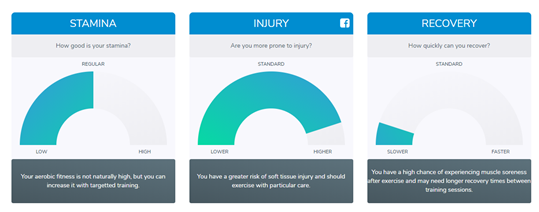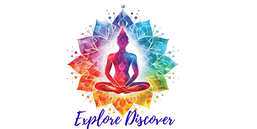|
Did you know that there are genes that affect your muscle power, strength, energy, endurance, flexibility, injury risk and recovery time? There are also genes that affect your weight, body size, appetite, fat storage, fat burning capacity, cholesterol and triglycerides levels, fatty acids processing ability AND how much drinking coffee affects you?!! My DNA (https://www.mydna.life) offers a service where you can pay online, they send out a testing kit to you (you take a swab from the inside of your cheek), you sent it back and voila, they send you your results in an easy to understand format. Although my results don't change anything for me, it certainly confirms everything I’ve always felt, and it’s nice to have science backing me up! It’s pretty fascinating stuff. I am currently training for a Half Marathon (in the Goldcoast in July) and have always said that I am not a natural runner, especially long distances. It’s always been a massive struggle for me. My DNA has confirmed that I am only 39% built for Endurance and 61% built for Power. My strengths according to my DNA is short bursts of high intensity movements with ample recovery time. This means that running long distances is VERY hard for me. But that’s not to say that this DNA result means I, or you, cannot do it. With adequate training and commitment, it is absolutely possible to train the body to be able to handle it. It’s been my Goal to complete a Half Marathon for years but injuries, pregnancy and motherhood kept putting it off until now. It’s to prove to myself and to others that anything is possible if you really set your mind on it, regardless of whether or not it feels natural to you, or you have genes that make it more difficult. Even though I am a Yoga teacher, I have always known that I am not naturally flexible. My body always feels tight and I have always injured easily. My DNA results has confirmed that I have genes that give me excellent muscle power and energy but I am at a very high risk of suffering from injuries due to my joints, ligaments, tendons and muscles being stiff. I am not alone here, only 18.5% of the Australian population has an ideal result, all the rest have increased risk like me. No surprise?! For those that have this gene, it is very important that you stretch as much as possible in a safe way to reduce the chance of injuring yourself and loosing range of motion. For the naturally flexible, it is important to focus on strength training to make sure your joints, ligaments and tendons have the support it needs to keep everything in place. For those of you that like to smash out training sessions every day of the week just be aware, 19% of the Australian population has the same gene as me which means that muscle fibre regeneration is slow. We need our rest days in between sessions and are more likely to experience muscle soreness after exercise. Rest days can include movements such as yoga, walking, swimming etc As for Nutrition, each one of us responds differently to the food we eat. There is no blanket rule that everyone should follow. This makes it very overwhelming to know what’s right for us an individual. My DNA has revealed that I function better with a Lower Fat Diet. Some people need less carbs, and some people need a lot more protein. Some people put on muscle and gain muscle definition easily, some don’t, some people are naturally tiny and some people are naturally rounder. This all affects how we should eat for our individual body types (carbs/fats/protein balance). There’s a gene that affects your eating habits, food preferences, appetite and your brains ability to know when your full. If you’re overweight, this nasty little gene may be one of the things making it harder for you to loose weight. 50% of the Australian population has this gene that moderately increases their appetite, and 15% has the gene that significantly increases appetite. Amazingly I am part of the lucky 2% that has a gene that makes it less likely to store excess calories that I have consumed! 80% of the Australian population has the gene that it the typical accumulation of fat if more food than is required is consumed. This can lead to a higher chance of Type 2 Diabetes and higher BMI. Yikes! Our Basal Metabolic Rate is the amount of calories we need to consume just to be alive. On top of that is calories that we need to give us energy for the movements we do in a day, including exercise. Every calorie we eat on top of that is considered excess. If you would like to work out your BMR, check out this calculator - https://www.mydr.com.au/tools/basal-energy-calculator. On the flip side, I also have a gene that means I have reduced levels of the hormone needed to burn fat. So when I do put on weight, it’s very difficult to loose. The more overweight you are, the less of the hormone you produce so it’s a downward spiral. 52% of the Australian Population share this result with me. Only a mere 8% are blessed in this area. The struggle is real guys! But as mentioned before in regards to training, it is still possible to beat the odds that are against us. Having this awareness of our genes means we don’t have to be so hard on ourselves if we are not seeing the results we want instantly. It takes time and focus, and remember, the best thing to do is just try to make healthy decisions 80% of the time, we’re allowed treats too! What and how we eat needs to be sustainable and suitable for our lives PERMANENTLY. Fad diets may work in the short term but as soon as eating habits change, everything else changes with it. Learning to listen to the body and what it’s telling us during and after we eat, and allowing the time to really taste and enjoy our food as we eat instead of eating while distracted will really make a difference. Now, coffee drinkers!! Some people can process caffeine very quickly which means the affects wear off faster than normal (44%). If you drink a lot of coffee, you may be one of these people! How coffee affects your brain can be related to genes as well. 49% of the population can experience a moderate amount of anxiousness and sleep disturbance when larger quantities of caffeine is consumed. 37% have a low risk of feeling jittery but they have a high chance of sleep disturbance. 14% have a low chance of caffeine affecting their sleep but a higher chance of feeling anxious. Although anxiousness induced by coffee begins to disappear if caffeine is consumed frequently. For me it’s said that I can experience the effects of caffeine for up to 6-8 hours! It’s recommended that I don’t have one after 3 hours before bed, and I have a moderate chance of it making me jittery (it sure does which is why I don’t drink it!). Interesting! All of this confirms more reasons why we cannot compare ourselves to others. We are all unique, from our DNA, to our life journey, lessons, experiences, feelings, skills and desires. We just have to keep being the best version of ourselves that we can be every single day, with no judgement that we are less or more than anyone else. Other peoples opinions, or even our DNA, do not have to define us. On side note, when I did my Natural Therapy Diploma I learnt about Epigentics. 95% of us have been born “genetically healthy” but for the 5% that have inherited genes that predispose you to things such as Cancer, Diabetes etc, it doesn’t mean that you will get it. If you are in the 95%, it still doesn’t mean you won’t end up with these diseases as well. The expression of your genes can be turned on and off due to environmental influences. Switching On genes can be positive in the instances of activating anti-cancer cells, but we definitely don’t want the cancer causing genes to be switched on! This is how twins who have the same genetic make up can end up looking different over time and can end up with different illnesses depending on how they are living their lives. Poor nutrition, sedentary lifestyles (not being active) and smoking are the main causes for switching on the nasty genes. Also such things as pollution, chemicals, stress etc Eating a healthy diet filled with antioxidant foods will help keep those bad genes off. Trying to move your body as much as possible with the balance of relaxation and mindfulness practices to combat stress, and trying to live naturally and chemically free (think cleaning and beauty products, processed foods etc) as much as possible will definitely help too. Fascinating stuff!!
0 Comments
|


